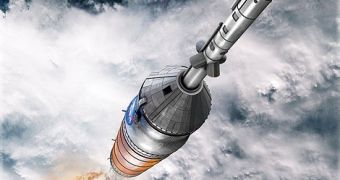NASA's independent Office of the Inspector General (OIG) issued its yearly assessment related to the agency's most difficult situations to be addressed in the future. They are all related to money at some point. The most important is, as probably expected, concerns the space shuttle retirement program and having the replacement system ready in due time.
Although the shuttles were scheduled for retirement in September 2010, the Congress recently forbid the agency from taking measures until the new president reaches a firm decision in this regard. Nevertheless, the program's first steps have been made for about two years now, consisting of terminating contracts with companies providing shuttle parts.
According to the report, cited by New Scientist, resuming them would prove very challenging financially, as would upgrading the old shuttle, "Shuttle suppliers have already begun retooling efforts, and convincing suppliers to again produce unique specialty items based on 30-year-old technology is likely to come at a premium price". NASA also has to address recertification concerns related to the shuttle parts more seriously, despite their claiming otherwise.
The delay of the retirement program will also mean that it will feed on the resources required by the installment of the new system, especially since keeping the old shuttle in space will cost NASA between $2.5 billion to $4 billion yearly, while also using facilities and personnel needed for building and testing the new Ares I rocket and the Orion capsule, not to mention that these have problems of their own, which may make the budget they require sky-high.
Among the other difficulties the agency is experiencing is that, as they hurry to have the ISS or the new shuttle system ready in time, its officials are willing to accept risks that jeopardized previous missions, such as Columbia or Atlantis. There would also be the agency's failure to deliver a thorough financial statement for years now, as well as the lack of a proper cost estimation department (which, for instance, translated into Mars Science Laboratory's running $300 million over the allocated budget).
And if these were not enough, NASA technicians also have to deal with the poor security systems that have been the target of hackers worldwide through the years. The computers that are not integrated in the main network of the agency, but run its data, such as this August's case of an ISS laptop found to contain a virus, are also of great concern. For more details related to the OIG report, go here.

 14 DAY TRIAL //
14 DAY TRIAL //